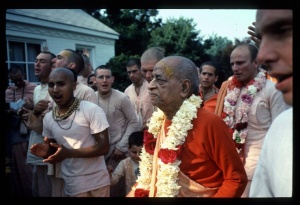CC Madhya 23.8 (1975): Difference between revisions
(Vanibot #0027: CCMirror - Mirror CC's 1996 edition to form a basis for 1975) |
(Vanibot #0020: VersionCompareLinker - added a link to the Version Compare feature) |
||
| Line 2: | Line 2: | ||
<div style="float:left">'''[[Sri Caitanya-caritamrta (1975)|Śrī Caitanya-caritāmṛta (1975)]] - [[CC Madhya (1975)|Madhya-līlā]] - [[CC Madhya 23 (1975)|Chapter 23: Life's Ultimate Goal — Love of Godhead]]'''</div> | <div style="float:left">'''[[Sri Caitanya-caritamrta (1975)|Śrī Caitanya-caritāmṛta (1975)]] - [[CC Madhya (1975)|Madhya-līlā]] - [[CC Madhya 23 (1975)|Chapter 23: Life's Ultimate Goal — Love of Godhead]]'''</div> | ||
<div style="float:right">[[File:Go-previous.png|link=CC Madhya 23.7 (1975)|Madhya-līlā 23.7]] '''[[CC Madhya 23.7 (1975)|Madhya-līlā 23.7]] - [[CC Madhya 23.9 (1975)|Madhya-līlā 23.9]]''' [[File:Go-next.png|link=CC Madhya 23.9 (1975)|Madhya-līlā 23.9]]</div> | <div style="float:right">[[File:Go-previous.png|link=CC Madhya 23.7 (1975)|Madhya-līlā 23.7]] '''[[CC Madhya 23.7 (1975)|Madhya-līlā 23.7]] - [[CC Madhya 23.9 (1975)|Madhya-līlā 23.9]]''' [[File:Go-next.png|link=CC Madhya 23.9 (1975)|Madhya-līlā 23.9]]</div> | ||
{{CompareVersions|CC|Madhya 23.8|CC 1975|CC 1996}} | |||
{{RandomImage}} | {{RandomImage}} | ||
==== TEXT 8 ==== | ==== TEXT 8 ==== | ||
| Line 27: | Line 26: | ||
<div class="translation"> | <div class="translation"> | ||
" 'When one develops an unflinching sense of ownership or possessiveness in relation to Lord Viṣṇu, or, in other words, when one thinks Viṣṇu and no one else to be the only object of love, such an awakening is called bhakti [devotion] by exalted persons like Bhīṣma, Prahlāda, Uddhava and Nārada.' | |||
</div> | </div> | ||
Latest revision as of 15:00, 27 January 2020

A.C. Bhaktivedanta Swami Prabhupada
TEXT 8
- ananya-mamatā viṣṇau
- mamatā prema-saṅgatā
- bhaktir ity ucyate bhīṣma-
- prahlādoddhava-nāradaiḥ
SYNONYMS
ananya-mamatā—having a sense of relationships with no others; viṣṇau—in Lord Viṣṇu, or Kṛṣṇa; mamatā—the sense of ownership; prema-saṅgatā—endowed only with love; bhaktiḥ—devotional service; iti—thus; ucyate—is said; bhīṣma—by Bhīṣma; prahlāda—by Prahlāda Mahārāja; uddhava—by Uddhava; nāradaiḥ—and by Nārada.
TRANSLATION
" 'When one develops an unflinching sense of ownership or possessiveness in relation to Lord Viṣṇu, or, in other words, when one thinks Viṣṇu and no one else to be the only object of love, such an awakening is called bhakti [devotion] by exalted persons like Bhīṣma, Prahlāda, Uddhava and Nārada.'
PURPORT
This verse, quoted from the Nārada-pañcarātra, is found in the Bhakti-rasāmṛta-sindhu (1.4.2).